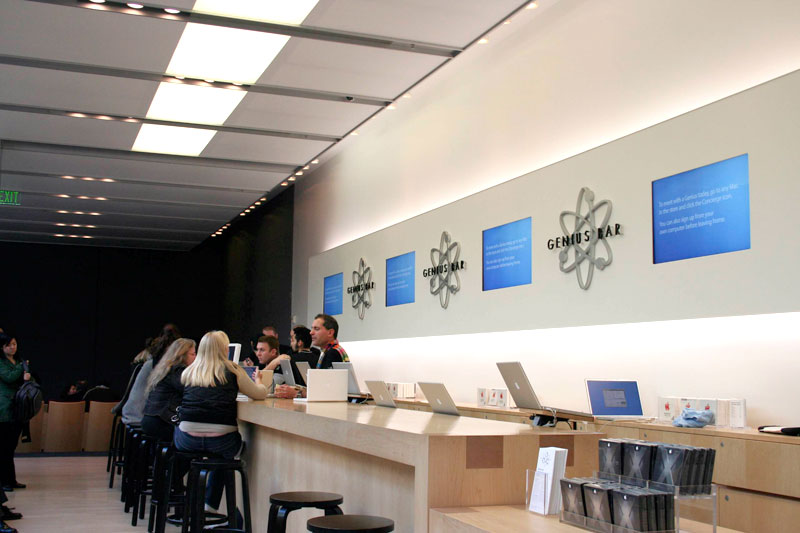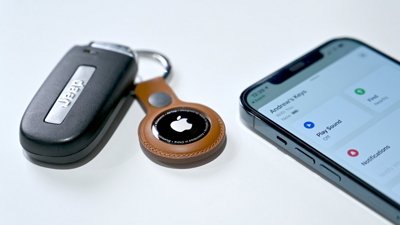Apple accused of short-shrifting disabled retail shoppers
Two San Francisco women have filed a lawsuit that accuses Apple of largely ignoring accessibility laws at one of its retail stores, making shopping or service trips all but impossible for those who use a wheelchair.
Both of the plaintiffs, Nicole Brown-Booker and Jana Overbo, require wheelchairs and recount separate experiences in May and July of this year which they characterized as both frustrating and humiliating. In both cases, neither woman was able to properly reach products or service desks at the store — most of which were placed on a table or counter far out of reach. For Overbo, this meant a wasted trip. Unlike other customers, she was unable to watch as a Genius Bar technician serviced a software issue she had been experiencing on her Mac. Although the technician claimed to have "fixed" the issue, Overbo returned home with her Mac only to discover the software issue remained.
Access to each of the common features of the store was difficult in general, the women added. Neither of the complainants could reach the elevator buttons on their own, and the store's presentation theater had no wheelchair accessible seating areas or passageways needed to attend one of Apple's instructional workshops. Just completing a purchase was difficult due to the height of the cash registers, the plaintiffs said. To accommodate Brown-Booker's need to sign for a computer game, one store clerk needed to crawl underneath the cashiers' stand, untangle wires, and then pull the credit card system off the counter. This took some time and drew undue attention to Brown-Booker's disability, forcing other customers to wait behind her.
While the Stockton Street venue was itself difficult to navigate, the problem was allegedly compounded by a lack of help from the Apple's retail staff. Many seemed to unintentionally ignore both of the women, leaving them at the mercy of a few kind customers who eventually asked if they needed help selecting software titles from the store's shelves.
At the Genius Bar, it was not even clear that the Genius Bar staff could see over the counter to spot a customer in a wheelchair, Overbo told the representing law firm for the complaint, the Law Offices of Paul L. Rein. Similarly, she was unable to properly check in for her Genius Bar appointment or view the LCD displays listing the order of upcoming appointments. She was forced to wheel back-and-forth across the length of the bar, desperately attempting to inform staffers that she had arrived for her appointment.
The Genius Bar at Apple's San Francisco flagship shop on One Stockton Street
It's apparent from these occurrences, the two women said, that Apple retail stores do not have a policy in place to assist handicapped shoppers. And if they do, it wasn't being followed.
Since modifying the building is entirely within Apple's reach, the company has no legal excuse to avoid obeying the federal and state laws for granting access, according to the lawsuit. And with no measures in place to have employees serve disabled customers, both of the plaintiffs have warned that they and any other disabled customers would continue to face discrimination simply by entering the store.
The lawyers representing Brown-Booker and Overbo are requesting a jury trial with compensation for the emotional and physical losses caused by Apple's seemingly neglectful approach. But as becomes evident in the lawsuit, both women are less interested in punitive action and more in successfully pressing for the needed changes to the building's layout and employee policies, letting either of them return to the Stockton Street outlet as equals to their fellow customers.
The plaintiffs fully "intend to return and patronize this Store, once legally required access has been provided," according to the suit.
 Aidan Malley and Kasper Jade
Aidan Malley and Kasper Jade











 Andrew Orr
Andrew Orr
 William Gallagher
William Gallagher

 Mike Wuerthele
Mike Wuerthele
 Christine McKee
Christine McKee

 Malcolm Owen
Malcolm Owen
 Amber Neely
Amber Neely







